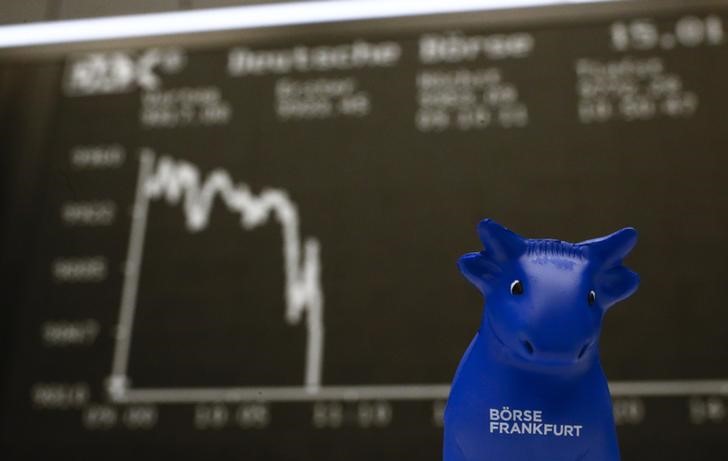
© Reuters.
By Peter Nurse
Investing.com – European stock markets are expected to open lower Wednesday, as investors continue to fret about the region heading into recession as inflationary pressures remain.
At 02:00 ET (06:00 GMT), the DAX futures contract in Germany traded 1% lower, CAC 40 futures in France dropped 0.6%, and the FTSE 100 futures contract in the U.K. fell 0.9%.
German industrial production dropped 0.3% on the month in July, data released Wednesday showed, weakening from the revised 0.8% growth the previous month, as the outlook for Europe’s largest economy continued to darken in the wake of the Russian invasion of Ukraine in February and the associated regional energy crisis.
There is further data to study later Wednesday, in the form of second-quarter Eurozone GDP and employment numbers, and they are both expected to point to a deteriorating economic situation.
These numbers come just a day before the European Central Bank’s next policy meeting, where the governing council is widely expected to aggressively lift interest rates to try and curb a runaway inflation trend even at the expense of growth in the region.
The news out of Asia also weighed on sentiment as China’s trade surplus fell sharply in August from the prior month, with both exports and imports seeing large contractions, as new COVID-related disruptions and an energy shortage weighed heavily on economic activity.
Elsewhere, new U.K. prime minister, Liz Truss, promised a major package of support this week to tackle soaring U.K. energy bills as she settled into her first day in office.
She succeeds Boris Johnson with the country facing brutal economic headwinds, and is expected to announce Thursday plans that could see the government spend as much as 200 billion pounds ($230 billion) over the next 18 months to contain energy prices.
Oil prices fell Wednesday, erasing all the week’s previous gains as COVID-19 lockdowns in China add to fears of slowing global economic growth and the associated hit to demand.
Data released Wednesday showed that Chinese crude oil imports fell 9.4% in August from a year earlier, as the country’s stringent COVID curbs kept a number of cities under lockdown, curbing people movement and oil demand at the world’s top crude importer.
The oil market bounced at the start of the week after the Organization of the Petroleum Exporting Countries and allies, a group known as OPEC+, announced a cut in output of a modest 100,000 barrels per day in October.
By 02:00 ET, U.S. crude futures traded 1.9% lower at $85.20 a barrel, dropping to the lowest since Jan. 26, while the Brent contract fell 1.7% to $91.25, the lowest since Feb. 18.
Additionally, gold futures fell 0.4% to $1,705.25/oz, while EUR/USD traded 0.1% lower at 0.9891.
Source: Investing.com



























